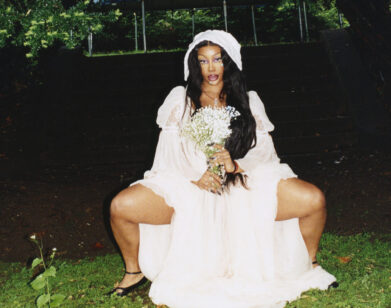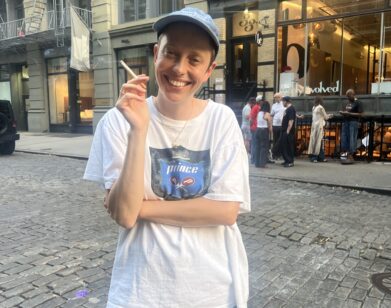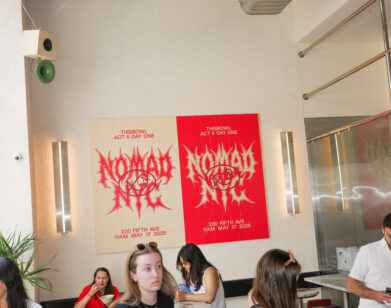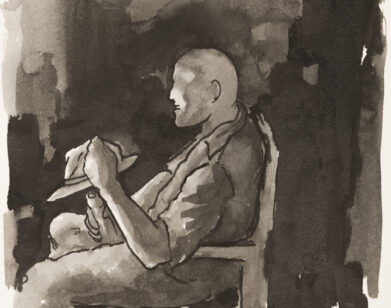Morgan Spurlock, on the Inside
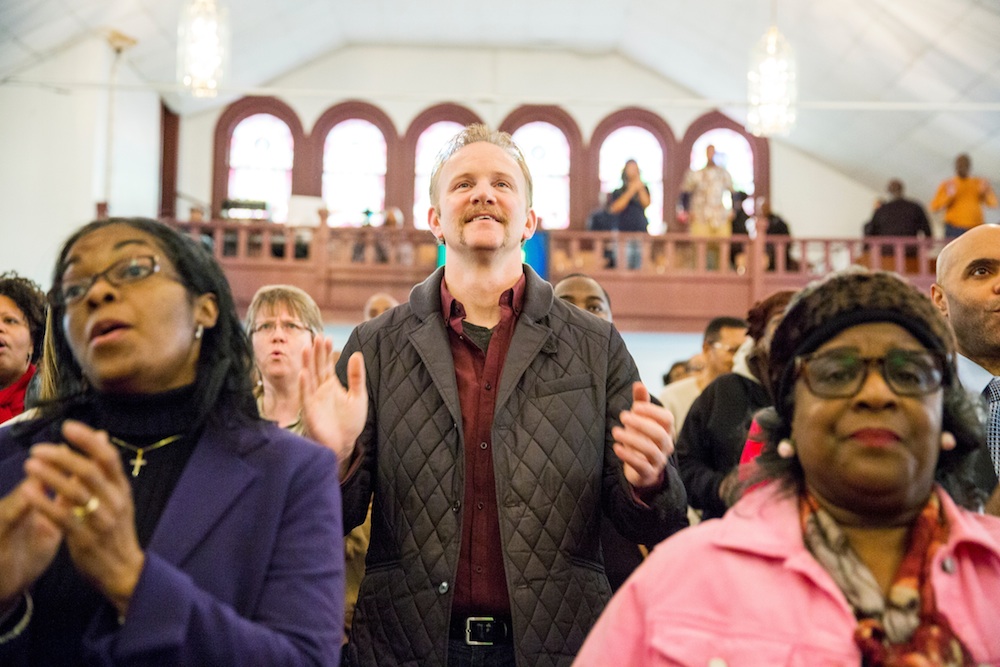
ABOVE: MORGAN SPURLOCK
Morgan Spurlock did not grow up with the goal of becoming a documentary filmmaker. “I wanted to be Spielberg,” the West Virginia native says over the phone. “I wanted to write and direct scripted movies.” Sometime in his early 20s after graduating from NYU film school, Spurlock changed his mind. In 2003, he released Supersize Me and became famous. Engaging and accessible, Spurlock’s style of journalism does not appeal to everyone. “There were people who, when that film came out, called it ‘Jackass journalism,'” the filmmaker recalls. “Here was something that combined that insane, watching people do something crazy and asinine [style] with real, proper journalism documentary filmmaking.” But Spurlock is not a “doc purist.” “The whole genre is evolving. There are docs that can be comedies, there are docs that can be dramas, there are docs that can be thrillers. We’ve broken the idea of movies into so many different genres and subgenres; documentaries have the same amount of subgenres in the way that you can tell the stories.”
This weekend, the second season of Spurlock’s series Morgan Spurlock: Inside Man will air on CNN. As the title suggests, each episode is a short documentary in which Spurlock penetrates the inner circles of America’s mad, bad, and dangerous to know. In the first episode, “Celebrity,” Spurlock trolls Jamie Lee Curtis and a sweating Ray Liotta as a paparazzi photographer. In the second, Spurlock meets a particularly unsettling group of “futurists,” who believe that they can become immortal.
EMMA BROWN: Was there any one episode that was particularly difficult to get through?
MORGAN SPURLOCK: Each episode is trying at different times for different reasons. There were parts of the celebrity episode, which is the premiere episode, where I started to feel dirty for what I was doing, as I’m sitting outside an alleged crack house hoping I might catch a glimpse or a photo of Lamar Odom. You can’t help but start to feel a little sleazy in those moments. But I think that’s part of what makes the show special—we’re taking you into these worlds in a way that you normally don’t get to. You see that there are things that are emotionally trying, that are taxing, that are hard for people to deal with. But you’re seeing that in a way that you don’t normally get to experience.
BROWN: Did becoming a paparazzo meet your expectations—did you expect to feel disgusted with yourself?
SPURLOCK: No, I didn’t expect to feel that bad about it. I thought that we’d be taking silly pictures. I didn’t know what my assignments were going to be, I didn’t know what I was going to get sent to go do or take pictures of. It’s eye-opening.
BROWN: Did you enjoy anything about being a paparazzo?
SPURLOCK: I love the people that you meet in these worlds; I loved spending times with Giles, the photographer who took me under his wing and showed me the ropes. He’s a fantastic guy. What you start to realize is that there are these guys who are good people. They’re not all scumbags; these are guys who get continually thrown under the bus, and there are guys out there who are good guys. They have families and real ethical standards when they take photographs. They won’t shoot kids. There are people out there who give that profession a good name, while simultaneously, as with any job, there are people who do the inverse and sully the name of people who are trying to do their best.
BROWN: Do you ever find it hard to keep your opinions to yourself ? If you come across an unethical paparazzo, for example.
SPURLOCK: For me, it’s all about finding the things that make people tick: what makes them make the choices they make, how they defend the choices they make. I don’t want to come in and judge someone. It’s not my position to come in and judge you, it’s my position to come in and tell your point of view and give people access to that point of view. Then you, as the viewer, [can] make up your own mind. That’s what I want to have happen—I want you to come into this show, see what the topics are, see what we talk about, and then walk away with your own opinion.
BROWN: Have you ever finished an episode with the same opinion you had coming into the episode?
SPURLOCK: That never happens with anything we make. Years ago, pre- me making my first feature film, I called a doc filmmaker friend of mine and asked for some advice. He went, “Sure, I’ll give you some advice. If the movie you end up with is the exact same movie you had in the beginning, then you didn’t listen to anyone along the way.” And that’s a fantastic piece of advice for any doc filmmaker. Unless you’re making a historical doc—telling something where you know how it ends—you have to go in with an open mind and be willing to be influenced by people you meet or stories you hear. Because what will happen is, you’ll come to a door and that door will be closed, but three more will open. Someone will tell you something that will point you in a completely different direction where you’ll suddenly realize, “This isn’t the story we should be telling at all, it should be this story.” This season, we went in to an episode of Inside Man to tell a story about privacy and the NSA—on the heels of all the Snowden stories breaking. As we started getting into the idea of all this privacy, it became much more about personal access and personal privacy. We started realizing that we, as a population, give up more of our own private information without even thinking twice about it. We put ourselves out there in the open for the world to see; we are becoming this open generation of people. As we were telling the story, it shifted and this became the bigger story to tell.
BROWN: Have you ever had to give up on an investigation?
SPURLOCK: We’ve been really fortunate in everything that we’ve done—whenever we’ve started shooting something, we’ve never been in the position where we’ve had to bail, or stop shooting, or abandon the process. We’ve always done enough preparation to know why the story is important, or why we think people will find it interesting. The question then is getting access. If you look at this season, there’s an episode about student athletes—these kids who basically make millions of dollars for their universities. The question is: should these kids get paid? Should they be getting a piece of that, more than just getting a “college education”? As we started calling universities, there were a lot of colleges that did not want us coming onto their campus and telling this story. Colleges that had had many offenses against them from the NCAA, they’d been fined many times for breaking the rules. I think these schools did not want to be in the position of admitting or putting their program under a microscope. So that was one of the situations where it was difficult for us to find access, but once we got it—it’s a breakthrough show.
BROWN: You found student athletes that were willing to talk to you?
SPURLOCK: We filmed that episode at Ole Miss, in Oxford, Mississippi, a huge football program—one of the biggest football programs in the United States. The fact that that school let us in and let us tell the story is incredible, and there were students who were brave enough to talk about it. You need more kids like that. You need people who are willing to speak out and let people know their thoughts and their feelings on topics like this.
BROWN: Do you think that being a documentary filmmaker has made you a better listener in your personal life?
SPURLOCK: Yes, I think it’s made me pay more attention to the people around me. My mother did an incredible job—one, of just being a great mom, but two, of instilling a tremendous amount of empathy into me as a young man, as a young person. My mom was kind of this collector of people; throughout my childhood, it didn’t matter who you were. She was a high school counselor and then a junior high counselor, and she didn’t just counsel students, she counseled other teachers and administrators and coaches. Whoever needed to talk to someone always ended up talking to my mom. It felt like there was always someone who was either staying at our house, or sleeping on our couch, or coming over to dinner—somebody who needed a warm bed or a place to stay, just until they got back on their feet. My mom was that person who was always there to help someone, and it was instilled into me by her that, if you have the ability to help someone, you have to help them.
BROWN: Can empathy be learned?
SPURLOCK: I think it can be learned, and I think it can be instilled into people just as she instilled it into me. It’s instilled through action. You have to consistently show someone how it’s done, and then someone will make the choice. That’s what happened with me.
BROWN: Have all of your subjects seen their episodes?
SPURLOCK: No, none of them have. Nobody will see the episodes until they air starting this Sunday night.
BROWN: Does that make you nervous at all?
SPURLOCK: No, because the one thing I think the show is, is incredibly fair. The whole goal of the show is just to tell the truth. We seek to tell an honest story about what’s happening in the world. We’ve never had an instance where someone has felt betrayed or misled or wronged by what we do. Has there ever been a time where somebody probably wishes things might have been a little different? Of course. But I don’t think people felt like what we told them isn’t what happened. We come into it saying, “Here’s the story we’re going to tell,” we’re completely up front with them and that’s what ends up happening.
SEASON TWO OF MORGAN SPURLOCK: INSIDE MAN BEGINS THIS SUNDAY ON CNN.

